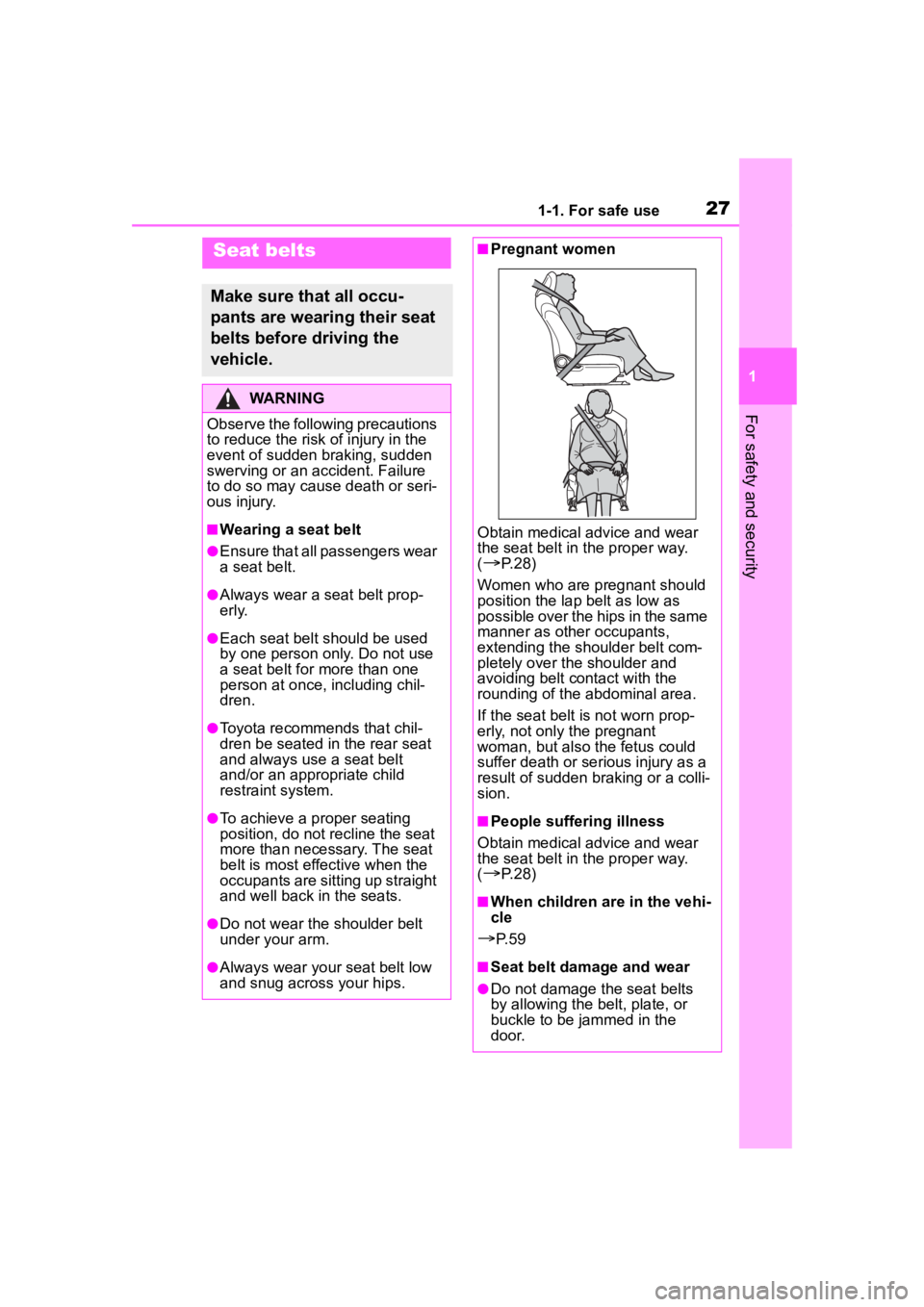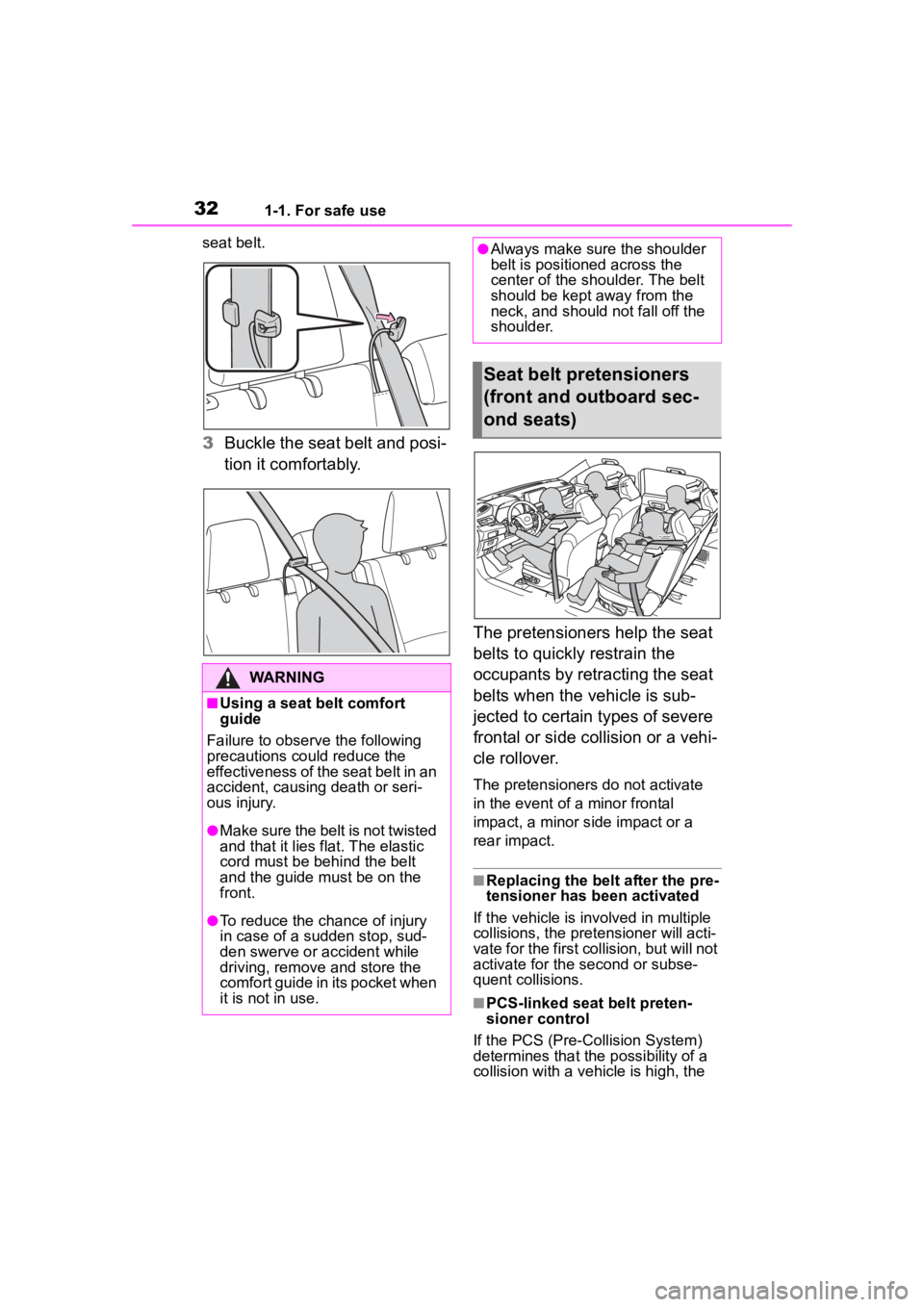2023 TOYOTA HIGHLANDER seats
[x] Cancel search: seatsPage 1 of 552

1
2
3
4
5
6
7
8
9
9
HIGHLANDER_U
Pictorial indexSearch by illustration
For safety
and securityMake sure to read through them
(Main topics: Child seat, theft deterrent system)
Vehicle status
information and
indicatorsReading driving-related information
(Main topics: Meters, multi-information display)
Before driving
Opening and closing the doors and windows,
adjustment before driving
(Main topics: Keys, doors, seats)
Driving
Operations and advice which are necessary for
driving
(Main topics: Starting engine, refueling)
Interior featuresUsage of the interior features
(Main topics: Air conditioner, storage features)
Maintenance
and careCaring for your vehicle and maintenance
procedures
(Main topics: Interior and exterior, light bulbs)
When trouble
arisesWhat to do in case of malfunction and emergency
(Main topics: Battery discharge, flat tire)
Vehicle
specificationsVehicle specifications, customizable features
(Main topics: Fuel, oil, tire inflation pressure)
For ownersReporting safety defects for U.S. owners, and seat
belt, SRS airbag and headlight aim instructions for
Canadian owners
IndexSearch by symptom
Search alphabetically
Page 2 of 552

2TABLE OF CONTENTS
For your information ........................5
Reading this manual ...................... 10
How to search ................................ 11
Pictorial index ................................ 12
1-1. For safe use Before driving ........................ 24
For safe driving ..................... 25
Seat belts .............................. 27
SRS airbags .......................... 34
Front passenger occupant clas- sification system.................. 43
Exhaust gas precautions....... 48
1-2. Child safety Riding with children ............... 49
Child restraint systems .......... 50
1-3. Emergency assistance Safety Connect ..................... 65
1-4. Theft deterrent system Engine immobilizer system ... 69
Alarm ..................................... 70
2-1. Instrument cluster Warning lights and indicators............................................ 74
Gauges and meters (7-inch dis- play) .................................... 79
Gauges and meters (12.3-inch display)................................ 82
Multi-information display (7-inch display)................................ 87
Multi-information display (12.3-inch display)............... 96
Head-up display ................. 103
Fuel consumption information ......................................... 1083-1. Key information
Keys ................................... 112
3-2. Opening, closing and locking the doors
Side doors .......................... 115
Back door ........................... 119
Smart key system .............. 131
3-3. Adjusting the seats Front seats ......................... 136
Rear seats.......................... 137
Driving position memory .... 142
Head restraints................... 145
3-4. Adjusting the steering wheel and mirrors
Steering wheel ................... 148
Inside rear view mirror ....... 149
Digital Rearview Mirror....... 150
Outside rear view mirrors ... 160
3-5. Opening, closing the win- dows and moon roof
Power windows .................. 162
Moon roof ........................... 165
Panoramic moon roof......... 168
4-1. Before driving Driving the vehicle.............. 174
Cargo and luggage ............ 181
Vehicle load limits .............. 184
Trailer towing...................... 18
5
Dinghy towing ....................19
6
4-2. Driving procedures Engine (ignition) switch ...... 197
Automatic transmission ...... 201
Turn signal lever................. 204
Parking brake ..................... 205
1For safety and security
2Vehicle status information
and indicators
3Before driving
4Driving
Page 20 of 552

20Pictorial index
■Interior
SRS airbags .................................................... ...................... P.34
Floor mats..................................................... ........................ P.24
Front seats .................................................... ...................... P.136
Rear seats ..................................................... ...................... P.137
Head restraints ................................................ ................... P.145
Seat belts ..................................................... ......................... P.27
Console box ....................................................................... P.341
Inside lock buttons ............................................ ................ P.118
Cup holders .................................................... .................... P.341
Assist grips ................................................... ..................... P.357
Rear seat entertainment system
*1, 2
*1
: If equipped
*2: Refer to “MULTIMEDIA OWNER’S MANUAL”.
Page 26 of 552

261-1. For safe use
Make sure that all occupants are
wearing their seat belts before
driving the vehicle. (P.27)
Use a child restraint system
appropriate for the child until the
child becomes large enough to properly wear the vehicle’s seat
belt. (
P.50)
Make sure that you can see
backward clearly by adjusting
the inside and outside rear view
mirrors properly. ( P.149, 150,
160)
WARNING
■For safe driving
Observe the following precau-
tions. Failure to do so may result
in death or serious injury.
●Do not adjust the position of the
driver’s seat while driving.
Doing so could cause the driver
to lose control of the vehicle.
●Do not place a cushion between
the driver or passenger and the
seatback. A cushion may pre-
vent correct pos ture from being
achieved, and reduce the effec-
tiveness of the seat belt and
head restraint.
●Do not place anything under the
front seats. Objects placed
under the front seats may
become jammed in the seat
tracks and stop the seat from
locking in place . This may lead
to an accident and the adjust-
ment mechanism may also be
damaged.
●Always observe the legal speed
limit when driving on public
roads.
●When driving over long dis-
tances, take regular breaks
before you start to feel tired.
Also, if you feel tired or sleepy
while driving, do not force your-
self to continue driving and take
a break immediately.
Correct use of the seat
belts
Adjusting the mirrors
Page 27 of 552

271-1. For safe use
1
For safety and security
Seat belts
Make sure that all occu-
pants are wearing their seat
belts before driving the
vehicle.
WARNING
Observe the following precautions
to reduce the risk of injury in the
event of sudden braking, sudden
swerving or an accident. Failure
to do so may cause death or seri-
ous injury.
■Wearing a seat belt
●Ensure that all passengers wear
a seat belt.
●Always wear a seat belt prop-
erly.
●Each seat belt should be used
by one person only. Do not use
a seat belt for more than one
person at once, including chil-
dren.
●Toyota recommends that chil-
dren be seated in the rear seat
and always use a seat belt
and/or an appropriate child
restraint system.
●To achieve a proper seating
position, do not recline the seat
more than necessary. The seat
belt is most effective when the
occupants are sitting up straight
and well back in the seats.
●Do not wear the shoulder belt
under your arm.
●Always wear your seat belt low
and snug across your hips.
■Pregnant women
Obtain medical advice and wear
the seat belt in the proper way.
(
P. 2 8 )
Women who are pregnant should
position the lap belt as low as
possible over the hips in the same
manner as other occupants,
extending the shoulder belt com-
pletely over the shoulder and
avoiding belt contact with the
rounding of the abdominal area.
If the seat belt is not worn prop-
erly, not only the pregnant
woman, but also the fetus could
suffer death or serious injury as a
result of sudden braking or a colli-
sion.
■People suffering illness
Obtain medical advice and wear
the seat belt in the proper way.
(
P. 2 8 )
■When children are in the vehi-
cle
P. 5 9
■Seat belt damage and wear
●Do not damage the seat belts
by allowing the belt, plate, or
buckle to be jammed in the
door.
Page 31 of 552

311-1. For safe use
1
For safety and security
ing and stowing the seat belt.
3Stow the plate and in
the holder on the roof.
In order to securely stow them,
firmly insert them as far as possi-
ble.
1Push the seat belt shoulder
anchor down while pressing
the release button .
2 Push the seat belt shoulder anchor up while pressing the
release button .
Move the height adjuster up and
down as needed until you hear a
click.
If the shoulder belt sits close to
a person’s neck, use the seat
belt comfort guide.
1
Pull the comfort guide from
the pocket.
2 Slide the belt past the slot of
the guide.
The elastic cord must be behind the
Adjusting the seat belt
shoulder anchor height
(front seats)
WARNING
■Adjustable shoulder anchor
Always make sure the shoulder
belt is positioned across the cen-
ter of your shoulder. The belt
should be kept away from your
neck, but not falling off your shoul-
der. Failure to do so could reduce
the amount of protection in an
accident and cause death or seri-
ous injuries in the event of a sud-
den stop, sudden swerve or
accident.
Seat belt comfort guide
(for the third center seat)
Page 32 of 552

321-1. For safe use
seat belt.
3Buckle the seat belt and posi-
tion it comfortably.
The pretensioners help the seat
belts to quickly restrain the
occupants by retracting the seat
belts when the vehicle is sub-
jected to certain types of severe
frontal or side collision or a vehi-
cle rollover.
The pretensioners do not activate
in the event of a minor frontal
impact, a minor side impact or a
rear impact.
■Replacing the belt after the pre-
tensioner has been activated
If the vehicle is involved in multiple
collisions, the pretensioner will acti-
vate for the first collision, but will not
activate for the second or subse-
quent collisions.
■PCS-linked seat belt preten-
sioner control
If the PCS (Pre-Collision System)
determines that the possibility of a
collision with a vehi cle is high, the
WARNING
■Using a seat belt comfort
guide
Failure to obser ve the following
precautions could reduce the
effectiveness of the seat belt in an
accident, causing death or seri-
ous injury.
●Make sure the belt is not twisted
and that it lies flat. The elastic
cord must be behind the belt
and the guide must be on the
front.
●To reduce the chance of injury
in case of a sudden stop, sud-
den swerve or accident while
driving, remove and store the
comfort guide in its pocket when
it is not in use.
●Always make sure the shoulder
belt is positioned across the
center of the shoulder. The belt
should be kept away from the
neck, and should not fall off the
shoulder.
Seat belt pretensioners
(front and outboard sec-
ond seats)
Page 35 of 552

351-1. For safe use
1
For safety and security
SRS curtain shield airbags
• Can help protect primarily the head of occupants in the outer seats
• Can help prevent the occupants from being thrown from the vehi cle in the
event of vehicle rollover
■SRS airbag system components
Front passenger airbag
“PASS AIR BAG ON” and “PASS AIR BAG OFF” indicator lights
Front side airbags
Curtain shield airbags
Side impact sensors (rear)
SRS warning light
Front passenger occupant classification system (ECU and sen-
sors)
Driver airbag
Side impact sensors (front door)
Side impact sensors (front)
Seat belt pretensioners and force limiters
Seat cushion airbag
Driver’s seat position sensor
Driver’s knee airbag
Driver’s seat bel t buckle switch
Front impact sensors